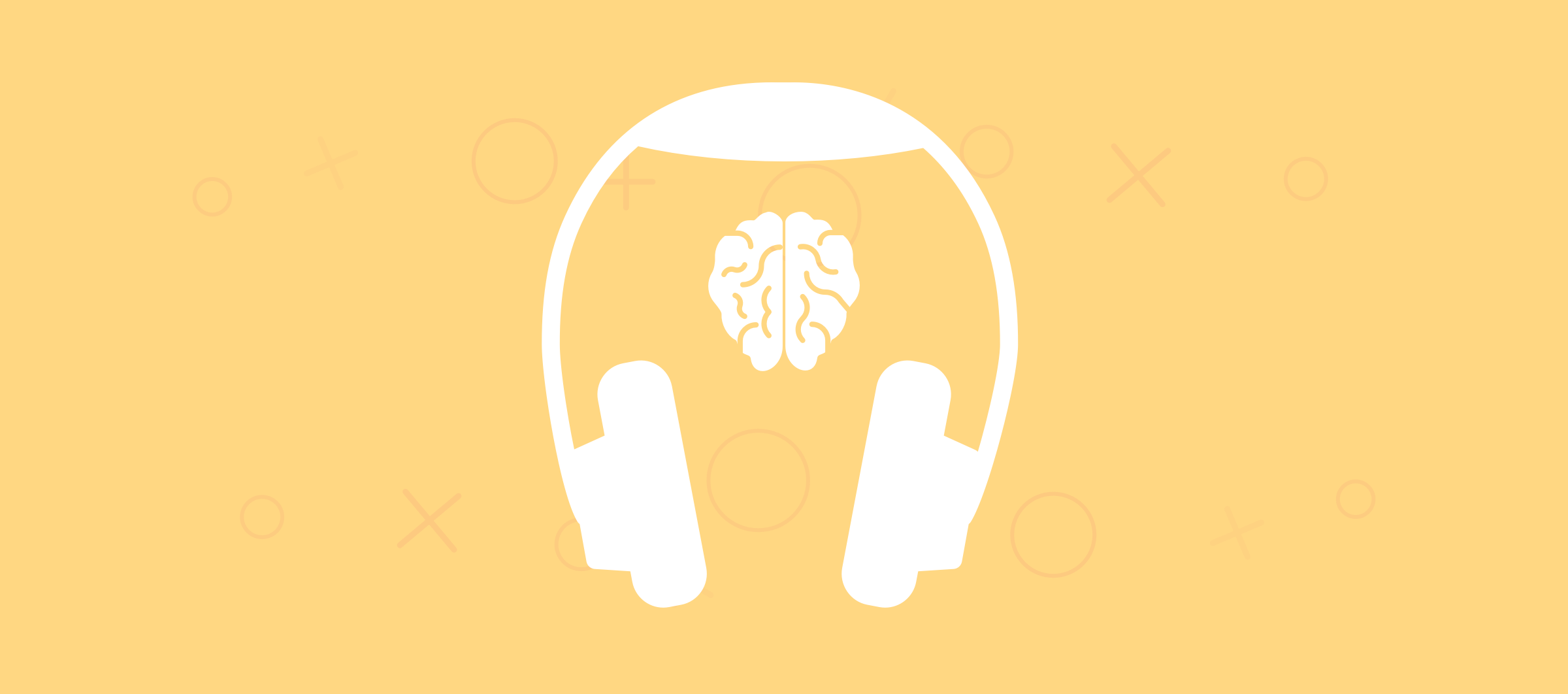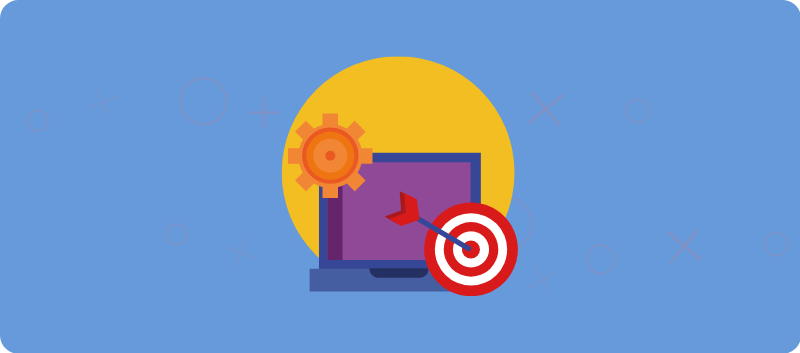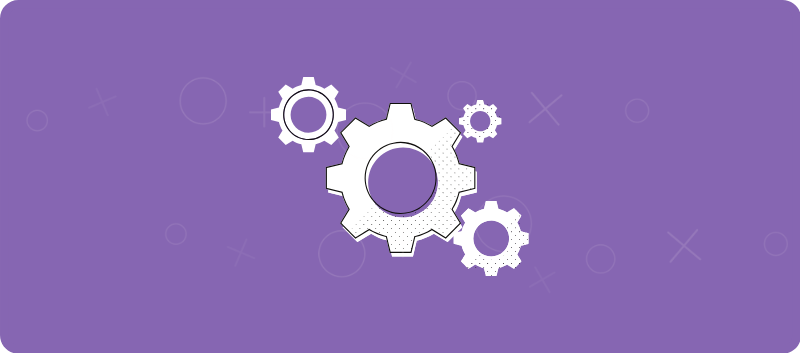Which Concentration Music is Best for Focus?
Music’s impact on productivity has intrigued researchers for over a century. We know that music can improve focus – but what music packs the best productivity bang for its buck, so to speak?
To answer this question, my team and I devoured dozens of studies, while also running our own experiments using a state-of-the-art electroencephalogram (EEG) device to monitor how different music affects the brain’s ability to focus.
In this article, you’ll learn:
- Which two genres are best for improving concentration while you work
- How happy, sad, fast, and slow music affect your concentration
- How the clarity of the task determines how effective focus music is
- How AI-generated music is improving focus music efficacy
- + more
TLDR: If you’re thinking “dude, just give me the goods. I ain’t got time for yo’ mumbo jumbo”, worry not. At the end of the article, I’ve shared a Spotify focus music playlist, curated by the Serene team, based on the insights in this article that you can play/follow/steal.
Without further ado, let’s dive in.
Which Genre of Music is Best for Boosting Focus?
According to a recent report of 4,553 people’s listening habits at work, the most popular artists to listen to at work are Foo Fighters, Drake and Kendrick Lamar. While this type of music may help with simple, repetitive tasks, it’s probably not ideal for more complex creative work.
So which genres are ideal? We set out to test six popular genres.
Numerous studies¹ have found that listening to popular music while working interferes with reading comprehension and information processing, especially when the music contained lyrics.
Ever tried to write an email while someone is talking to you? It’s frustrating. Your brain is trying to multi-task and process the lyrics and the email you’re writing, and as has been proven over and over again, multi-tasking is a myth.
Ambient & Classical Music Boost Concentration More Than Silence
In our experiment, we measured the response time and accuracy on a popular test used for measuring focus while playing different genres of music. Interestingly, only two genres in our experiment were noticeably better than silence at improving focus; classical and ambient music.
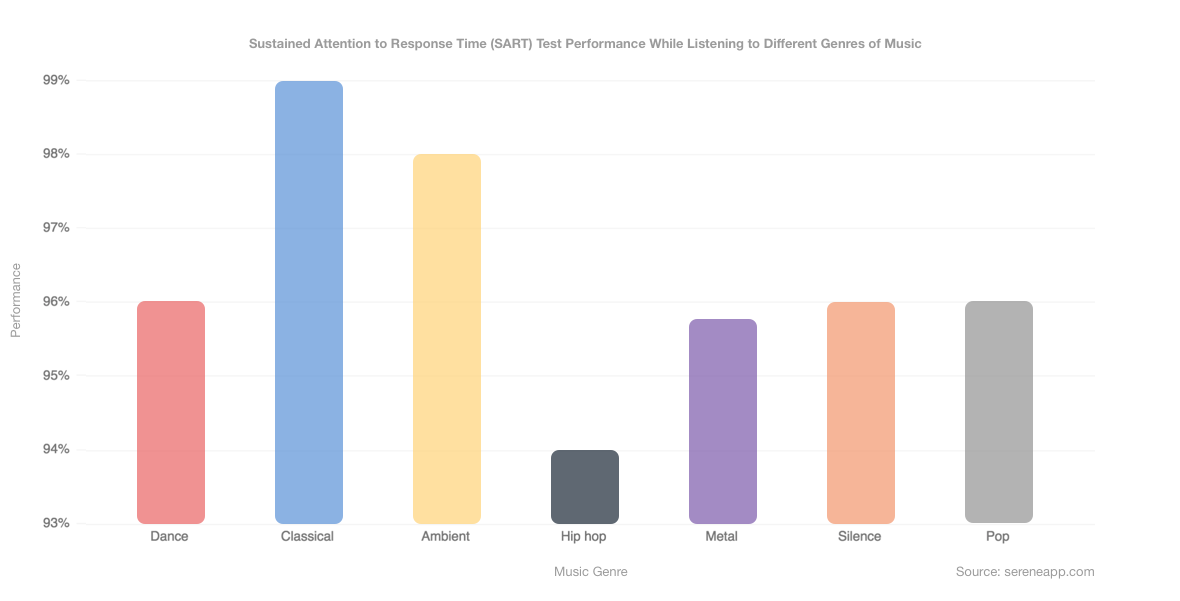
While subjects performed the test, we also recorded the change in gamma and alpha wave activity in the brain using EEG technology. Classical music and ambient music both displayed an increase in 30-40hz gamma wave activity and a reduction in 10-15hz alpha wave activity, which is associated with an increase in focus.
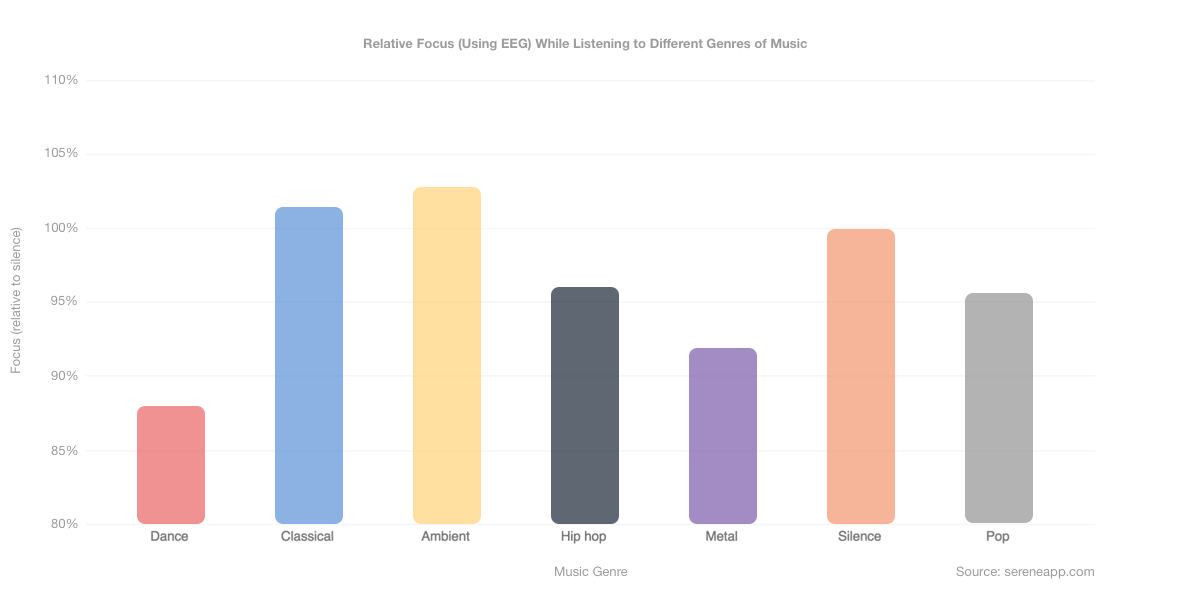
Despite this, only 6-9% of people said that these genres of music were their favourite genres of music to listen to at work.
I hate to be a party pooper, but this same report highlighted rock, metal, and pop to be the most popular genres of music to listen to at work, despite resulting in some of the biggest reductions in focus.
Sidenote: I was very upset to discover my favourite metal band, Children of Bodom, reduced my ability to focus by 10.44% : (
So, why do ambient and classical music improve focus?
What do these genres (or, at least the songs we used in our test) have in common? Well…
- They have no lyrics
- They’re relatively less complex in structure
- They’re sufficiently interesting yet easily ignorable
These findings are consistent with the conclusions of Dr Haake, whose research on the link between music and work productivity suggests that musical complexity and the presence of lyrics are two major factors that increase a piece of music’s likelihood of being distracting.
Of course, not all pieces of classical and ambient music are the same, so we dug deeper to explore how major (happy) music compared to minor (sad) music, and whether computer-generated music outperformed human created music.
Happy Music is Better for Productivity than Sad Music
A study from the University of Connecticut tested the effect of background music played in different modes (e.g. major, minor) on 104 undergraduate’s productivity. The study concluded that undergraduates listening to background music played in the major mode performed “significantly more tasks than did those in the minor mode”.

As an interesting side note, this same study also found that people enjoyed a conversation more when background music in the major key was playing.
In our experiment, we found the average test performance was 98% while listening to major music and 95% while listening to minor music. In addition, there was a 7.2% increase in brain activity associated with deep focus while listening to major music compared to listening to music in a minor key.
Slow music is better for complex tasks & introverts
A separate study² by Dr Haake found that the more complex the work and tasks are, and the more introverted the person is, the simpler the music they listen to should be as reflected in the beats per minute & density of the music.
Music Improves Productivity When the Task is Clear
Most productivity tools (Serene included) have one big limitation: They only work if you clearly define the task you’re trying to achieve.
Blocking distractions or playing focus music isn’t nearly as effective if you’re not sure what you should be doing in the first place. That’s why we designed Serene to ask you what your goal is each morning and then break your day into clear sessions around that goal.
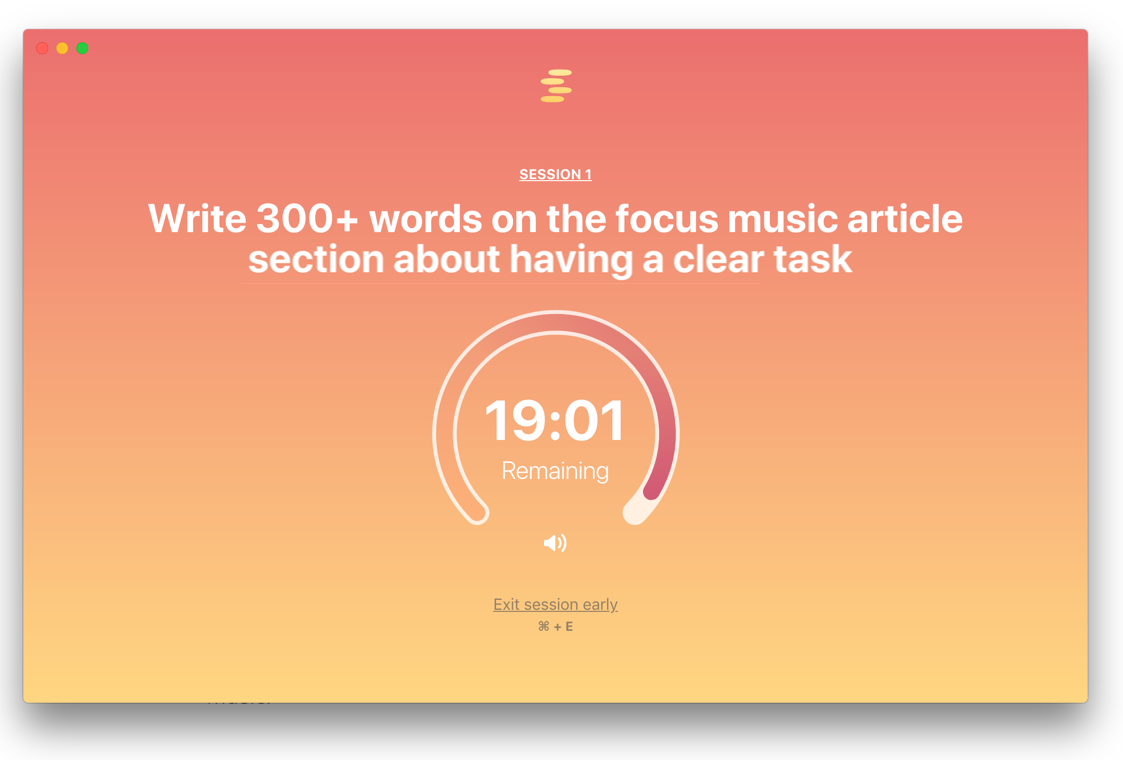
☝️Too meta?
Once you have a clear task defined, focus music unlocks a higher level of focus and efficiency. But without it, focus music is just another distraction.
Several studies have concluded that background music increases work productivity when the task at hand is clearly-defined and repetitive in nature but has negligible or adverse effects when the task is more complex or less defined. An example of the latter is when the task requires absorbing or retaining new information, such as learning a new language.
When it comes to absorbing & retaining new information distraction in any form is a big no-no.
According to this research, music is no exception. Participants in the study had a more difficult time recalling a complex task when they had listened to music.
So, whether you use a tool like Serene to plan your day or some other method of day planning, remember that this seemingly innocent step can be the difference between your other productivity tools helping you or hindering you.
Advances in AI are Improving Focus Music
Listening to music has always been a highly subjective experience.
But with technological advances in brain imagining such as EEG, PET, MRI, and fMRI, we can now start to understand how different musical inputs affect changes in the brain. As a result, a sub-genre of focus music has started to emerge that uses data from the brain to ‘tune’ music for a boost in focus.
Sometimes dubbed as ‘AI-generated music’, this music is perhaps more accurately an example of centaur intelligence, where human + artificial intelligence are combined to create music that is greater than the sum of its parts.
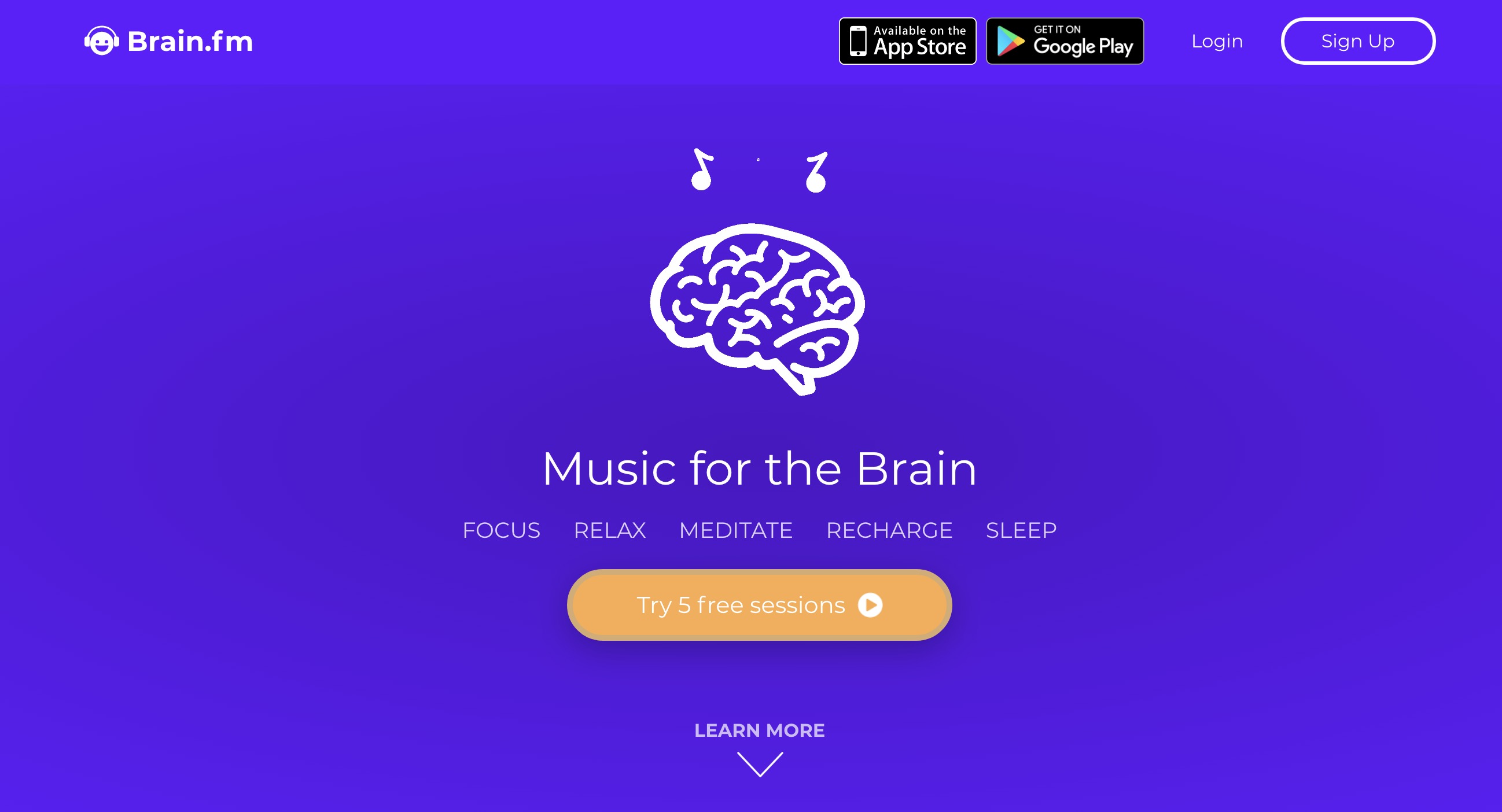
Brain.fm and Mubert are two popular services offering AI-generated focus music on demand for a monthly subscription. At Serene, we also plan to integrate AI-generated focus music for free, so that you can have focus music play in the background when you go into a focus session. Watch this space.
As more and more data is gathered in this space, we’re likely to see a significant increase in focus music generated with precision by algorithms.
Yet, while there are a lot of promising advances in focus music, there’s also a great deal of misinformation. Let’s look at one example where the claims don’t quite match reality.
The hype over binaural beats
Binaural beats have received a lot of hype over the past decade. When you play two sounds with almost identical frequencies in each ear through stereo headphones, the brain integrates the two signals and produces the sensation of a third sound (known as a binaural beat).
Some have taken it upon themselves to suggest that this sonic phenomenon has healing properties, can improve focus, and treat cancer. Really.
The consensus among the scientific community is that it’s inconclusive whether binaural beats can be perceived, let alone affect mood. This is not to say the theories outlined are false, but that far more research is needed before we place our belief in the magical focus-enhancing influence of binaural beats.
With that said, most binaural beat music falls into the genre of ambient music, which as we’ve already seen tends to have a positive impact on improving focus. So, there may well be a benefit to listening to binaural beats, but it may have little to do with the presence of phantom frequencies, and everything to do with the fact that, well, it meets the criteria of good focus music.
The ultimate focus music playlist
Based on the insights uncovered while researching this article, I’ve put together a Spotify focus music playlist with over four hours of carefully curated focus music. You can click the play button below, or right-click and save the playlist to your Spotify account below.
If you have any suggestions of songs to add, please let me know in the comments below and I’ll do my best to add your top picks.
References
(1a) Anderson, S. A., & Fuller, G. B. (2010). Effect of music on reading comprehension of junior high school students. School Psychology Quarterly, 25 (3), 178-187.
(1b) Johansson, R., Homqvist, K., Mossberg, F., & Lindgren, M. (2011). Eye movements and reading comprehension while listening to preferred and non-preferred study music. Psychology of Music, 40 (3), 339-356.
(1c) Avila, C., Furnham, A., & McClelland, A. (2011). The influence of distracting familiar vocal music on cognitive performance of introverts and extraverts. Psychology of Music, 40 (1), 84-93.
(2) Haake, A. B. (2010). Music listening in offices: Balancing internal needs and external considerations (Doctoral thesis, University of Sheffield, Sheffield) accessed from www.musicatwork.net



